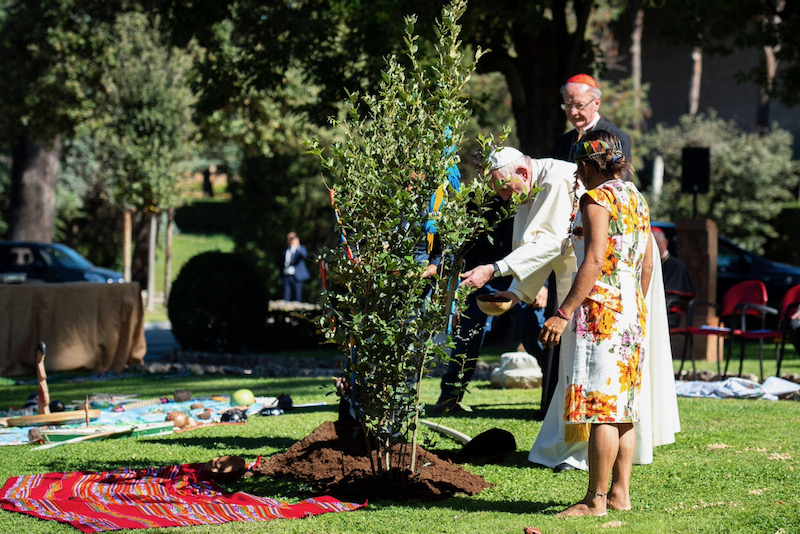At the first Chrism Mass of his Pontificate, Pope Francis famously urged the clergy gathered around him to have “the smell of the sheep”. It is a brilliant image, of a piece with his preference, expressed in Evangelii Gaudium n.48, for “a Church which is bruised, hurting and dirty because it has been out on the streets rather than a Church which is unhealthy from being confined and from clinging to its own security”. But what if the sheep entrusted to the pastor smell of success, middle-class respectability and prosperity?
Despite the fairly enormous loss of social standing and influence that clergy have lived through during the last couple of generations – both because of the wider currents of secularisation and because of the effects of ecclesiastical abuse scandals – it is still easy for a parish priest to assume the mantle of personal chaplain and end up simply baptising the local lifestyle. Secular clergy aren’t bound by vows of poverty, of course; but if I am as upwardly mobile in my aspirations and tastes as the more prosperous members of my flock – I who have no housing costs to worry about – will I be in any position to preach the Gospel effectively? Indeed, what is the point of the promise of celibacy if it is not also a commitment to a certain simplicity of means? I have no children to inherit from me and, whatever financial difficulties might drain diocesan funds in the aftermath of Covid-19, I am fairly confident that I shall neither be left destitute at retirement nor without work in the interim. Should that not free me to live radically? There is nothing sadder than a preacher of the Reign of God who in practice lives from one little consolation to the next.
My lifestyle choices aren’t intended as a criticism of others, whether of the people I pastor or of fellow clergy, but I try to live simply. I have almost given up buying stuff, really; partly because I have an extremely low boredom threshold when it comes to shopping and partly because I can’t think of anything that I need. I have no interest in clothes and no partner to insist that I “freshen” my wardrobe. I enjoy simple cuisine – pasta and rice, vegetables and fish, with meat a rarity. I have a six-year-old car with only 30,000 miles on the clock, because I try to cycle locally – the bike was my sixteenth birthday present – and use rail for longer distances.
Foreign travel, my one extravagance, has been out of the question for the last sixteen months. However, ecological concern had already made me increasingly unwilling to fly before Covid hit. International rail provides some wonderful alternatives … as long as you’re an unattached bachelor not trying to transport a whole family across the continent.
So far, so eccentric, you might say. But is it a help or a hindrance to preaching the Gospel in the community I serve? Can I still have “the smell of the – largely prosperous – sheep” while trying to stand apart from the pressures of consumerism? The question is as old as the Gospel. John the Baptist left Jerusalem and its temple to invite Israel to begin again at the Jordan. He was dismissed as “possessed”. Jesus, on the other hand, was in the thick of it, getting compromised time and again as he partied with the not-quite-respectable, “a glutton and a drunkard, a friend of tax-collectors and sinners” (Mt 11.19). In the world, not of the world, is the Johannine way of putting the challenge (Jn 17.16).
In this year of the G7 and COP26, my demeanour is no longer just a matter of my particular clerical style – roundhead rather than cavalier, puritan rather than party-animal. It’s about trying to open up a vista of a different future. We face the awkward question: can we have infinite growth in a finite world? I do not believe we can. Our lifestyle in the developed world is destroying both our planet and the poor. So I try to march to the beat of a different drum to open up a conversation. Our parish Live Simply Award isn’t much, but it is a start. So is the garden of the former parish nursery, now entrusted to the children of our primary school as the focus of their Eco-School project.
Pope Francis’ critique of “the globalisation of indifference” (EvG n.54), retains its power to shock: “Almost without being aware of it, we end up being incapable of feeling compassion at the outcry of the poor … The culture of prosperity deadens us; we are thrilled if the market offers us something new to purchase. In the meantime all those lives stunted for lack of opportunity seem a mere spectacle; they fail to move us.”
In the run up to last November’s election, Mary J. Trump published a book about her uncle, Too Much And Never Enough. That’s not just a good description of the 45th President of the USA. It’s pretty much a portrait of the way consumerism works. It doesn’t fill the void. It cultivates it, stimulates it with novelty (always Neos, neither Kainos – the biblical breakthrough in quality) because that keeps us buying. There’s little of the Gospel in it. Healing for the planet and hope for our future won’t come from more of the same. I look to the Beatitudes for hope, for myself, for those I serve and for our planet. And I look for inspiration to the mysticism of two men called Francis, one still alive and one 800 years dead: “If we feel intimately united with all that exists, then sobriety and care will well up spontaneously. The poverty and austerity of Saint Francis were no mere veneer of asceticism but something much more radical: a refusal to turn reality into an object simply to be used and controlled.” (Laudato Si’ n.12) Without rancour or accusation, I simply try to show my flock: enough is enough.
Fr Rob Esdaile is parish priest of Our Lady of Lourdes, Thames Ditton, Surrey.



 Loading ...
Loading ...
What do you think?
You can post as a subscriber user ...
User comments (0)